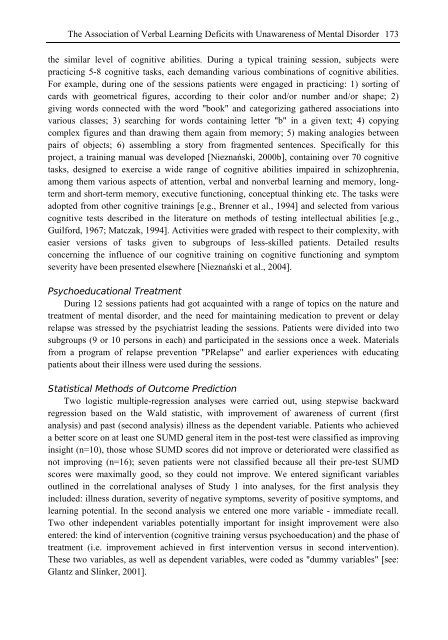Schizophrenia Research Trends
Schizophrenia Research Trends
Schizophrenia Research Trends
- No tags were found...
You also want an ePaper? Increase the reach of your titles
YUMPU automatically turns print PDFs into web optimized ePapers that Google loves.
The Association of Verbal Learning Deficits with Unawareness of Mental Disorder 173the similar level of cognitive abilities. During a typical training session, subjects werepracticing 5-8 cognitive tasks, each demanding various combinations of cognitive abilities.For example, during one of the sessions patients were engaged in practicing: 1) sorting ofcards with geometrical figures, according to their color and/or number and/or shape; 2)giving words connected with the word "book" and categorizing gathered associations intovarious classes; 3) searching for words containing letter "b" in a given text; 4) copyingcomplex figures and than drawing them again from memory; 5) making analogies betweenpairs of objects; 6) assembling a story from fragmented sentences. Specifically for thisproject, a training manual was developed [Nieznański, 2000b], containing over 70 cognitivetasks, designed to exercise a wide range of cognitive abilities impaired in schizophrenia,among them various aspects of attention, verbal and nonverbal learning and memory, longtermand short-term memory, executive functioning, conceptual thinking etc. The tasks wereadopted from other cognitive trainings [e.g., Brenner et al., 1994] and selected from variouscognitive tests described in the literature on methods of testing intellectual abilities [e.g.,Guilford, 1967; Matczak, 1994]. Activities were graded with respect to their complexity, witheasier versions of tasks given to subgroups of less-skilled patients. Detailed resultsconcerning the influence of our cognitive training on cognitive functioning and symptomseverity have been presented elsewhere [Nieznański et al., 2004].Psychoeducational TreatmentDuring 12 sessions patients had got acquainted with a range of topics on the nature andtreatment of mental disorder, and the need for maintaining medication to prevent or delayrelapse was stressed by the psychiatrist leading the sessions. Patients were divided into twosubgroups (9 or 10 persons in each) and participated in the sessions once a week. Materialsfrom a program of relapse prevention "PRelapse" and earlier experiences with educatingpatients about their illness were used during the sessions.Statistical Methods of Outcome PredictionTwo logistic multiple-regression analyses were carried out, using stepwise backwardregression based on the Wald statistic, with improvement of awareness of current (firstanalysis) and past (second analysis) illness as the dependent variable. Patients who achieveda better score on at least one SUMD general item in the post-test were classified as improvinginsight (n=10), those whose SUMD scores did not improve or deteriorated were classified asnot improving (n=16); seven patients were not classified because all their pre-test SUMDscores were maximally good, so they could not improve. We entered significant variablesoutlined in the correlational analyses of Study 1 into analyses, for the first analysis theyincluded: illness duration, severity of negative symptoms, severity of positive symptoms, andlearning potential. In the second analysis we entered one more variable - immediate recall.Two other independent variables potentially important for insight improvement were alsoentered: the kind of intervention (cognitive training versus psychoeducation) and the phase oftreatment (i.e. improvement achieved in first intervention versus in second intervention).These two variables, as well as dependent variables, were coded as "dummy variables" [see:Glantz and Slinker, 2001].
















